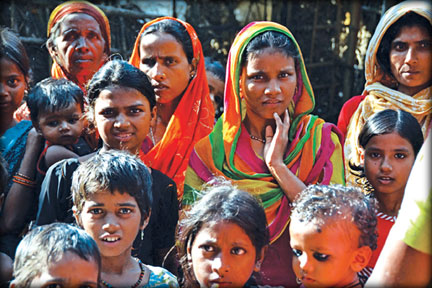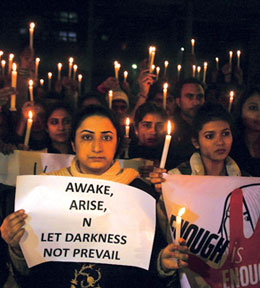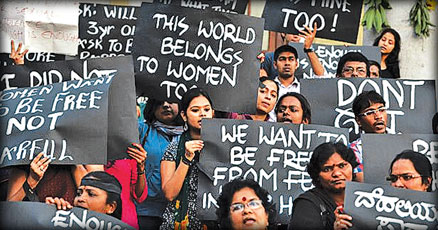|
Friday is International Women’s Day:
It’s time to end violence against women
By Indunil Thenuwara
Forty-five-year-old woman raped by five men at Wijerama...
Twenty-three-year-old New Delhi gang rape victim dies in Singapore
hospital...
Three young sisters raped and killed in Maharashtra...
Fifteen-year-old Pakistan girl shot by Taliban for promoting girls’
education...
|
One Woman
The first-ever song from the UN system, One Woman will be launched on
Friday. This musical celebration of women worldwide features more than
20 artistes, both men and women, from around the world and spreads a
message of unity and solidarity: We are “One Woman”.
The song is a rallying cry which would inspire listeners to join the
drive for women’s rights and gender equality. The song was written for
UN Women to celebrate its mission and work to improve women’s lives
around the world. The song would remind people that together, they can
overcome violence and discrimination. |
 |
|
A safer world for all
women and girls |
These are just a few of the ghastly headlines which had been
assaulting our senses over the past few months. The common thread that
runs through all these major news stories, reported from Sri Lanka and
the region, is that they are all instances of serious violence against
women and girls.
Despite advances made in the area of women’s rights and equality,
violence against women is a widespread phenomenon across the world,
appearing in many guises. It includes domestic violence, rape, incest
sexual harassment, abuse in the workplace and educational institutions
and sexual violence as a tool of war. It is not confined to a particular
segment of society, race or religion, but exists everywhere, in every
social class, in most homes.
While the forms of violence may vary across social, economic,
cultural and historical contexts, it remains a devastating reality in
all parts of the world, affecting seven out of 10 women in most
countries. This is just the tip of the iceberg, however, with 50 - 90
percent of rapes going unreported, according to the United States’ Rape,
Abuse and Incest National Network. It is a pervasive violation of human
rights and a major impediment to achieving gender equality, development
and peace.
Violence against women has become so rampant that the United Nations
has declared ‘A promise is a promise: Time for action to end violence
against women’ as the theme for the International Women’s Day 2013 which
would be observed on March 8 (Friday).
Pushing further towards attitudinal change, recognising, appreciating
and celebrating the vast strides made by women in the areas of
political, economic and social growth as well as their contribution to
every sector in life and initiating further steps to dismantle existing
barriers against the full advancement and emancipation of women are the
objectives of the event. Violence against women and girls has become a
core issue in this agenda.
Intention to dominate
Violence is defined as an act to intimidate, humiliate, hurt or
destroy by the use of force and includes action taken by one against
another with the intention to dominate. While physical violence is the
most serious and harmful, verbal or emotional violence could have a
similar damaging impact on the victim. Gender-based violence seriously
inhibits women’s ability to enjoy human rights and fundamental freedom
on an equal basis with men and is a form of discrimination, according to
Article 1 of the Convention on the Elimination of all Forms of
Discrimination Against Women.
 |
|
Justice for all women |
|
History of International Women’s Day (IWD)
 The first Women’s Day was observed on February 28, 1909 in the United
States following a declaration by the Socialist Party of America. An
International Women’s Conference was organised to precede the general
meeting of the Socialist Second International in Copenhagen in August
1910. The first Women’s Day was observed on February 28, 1909 in the United
States following a declaration by the Socialist Party of America. An
International Women’s Conference was organised to precede the general
meeting of the Socialist Second International in Copenhagen in August
1910.
The proposal to establish an annual International Women’s Day was
made by German Socialist Luise Zietz at this event and was seconded by
Clara Zetkin. The 100 women delegates from 17 countries who were present
at the event agreed to the idea as a strategy to promote equal rights,
including suffrage for women.
The following year, on March 18, 1911, IWD was marked for the first
time by over a million people in Austria, Denmark, Germany and
Switzerland. Women demanded that they be given the right to vote and to
hold public office. They also protested against sex discrimination in
employment.
From its official adoption in Russia following the Soviet Revolution
in 1917, the event was predominantly celebrated in Communist and
Socialist countries. In the West, IWD was first observed after 1977 when
the United Nations General Assembly invited Member States to proclaim
March 8 as the UN Day for Women’s Rights and International Peace.
It was in 1975, which had been designated International Women’s Year,
that the United Nations had given official sanction to, and began
sponsoring, International Women’s Day.
The day is now a national holiday in most countries and many events
are held by governments, women’s groups, charities and other
organisations around the world. The United States has designated March
as ‘Women’s History Month’.
A statement by UNWomen had described the day as a time to reflect on
progress made, to call for change and to celebrate acts of courage and
determination by ordinary women who have played an extraordinary role in
the history of their countries and communities. |
Violence inflicted on women such as family violence and abuse, forced
marriage, dowry deaths, acid attacks and female circumcision is
perpetrated due to traditional attitudes which consider women as being
subordinate to men and having stereotyped roles to perform, and may be
unleashed with the idea of ‘protecting’ or controlling women.
Violence against women is widespread in Sri Lanka too and has been on
the increase.
It is believed that five women are raped every day in the island
while 60 percent of women are victims of domestic violence which erodes
a woman’s fundamental right to life, security, bodily integrity, work
and safety at home.
More reports are coming to light on sexual harassment, incest,
assault, obscenity against women, unwanted advances, perverted acts,
forced pornography and prostitution and media violence almost on a daily
basis.
The Government has introduced tough legislation to arrest the trend
while the non-governmental sector, civil society and the public are
demanding action against perpetrators, preventive measures and redress
for victims.
Laws and treaties
The global community has already come a long way with national laws,
international treaties and widespread and growing awareness on ending
violence against women, but these measures are not enough. Promises made
by governments must be translated into concrete action, such as through
the provision of safe houses, free hotline services and free legal and
medical aid to survivors of violence.
The most important requirement, however, is an attitudinal change.
The seeds should be laid at home, where children, both male and female,
should be brought up from a young age with equal opportunities, equal
treatment and equal values.
They should be taught to respect all people regardless of differences
such as gender, race and religion. Children should be taught that it is
not alright for one half of humanity to carry out acts of violence
against the other half.
 |
|
Demanding justice for
the gang rape victim of New Delhi |
Women should learn to question gender imbalances in all walks of life
while men should challenge traditional assumptions, gender stereotypes
and outdated attitudes.
As UN Secretary-General Ban Ki-moon had said, launching the campaign
‘UNite to End Violence against Women,’ “All of us – men and women,
soldiers and peacekeepers, citizens and leaders – have a responsibility
to help end violence against women. States must honour their commitments
to prevent violence, bring perpetrators to justice and provide redress
to victims. And each of us must speak out in our families, workplaces
and communities, so that acts of violence against women cease.”
Eliminating violence against women is one of the most serious and
urgent challenges of the modern era. Every human being has a duty to
support and sustain a political and social environment where violence
against women and girls is not tolerated; where friends, family members,
neighbours, elders, men and women intervene to ensure that perpetrators
of violence are punished.
The time for complacency has run out. It is now time for us - in our
homes, communities and nations – to create a world that is safe for
women and girls, in which all women enjoy all human rights.
|



